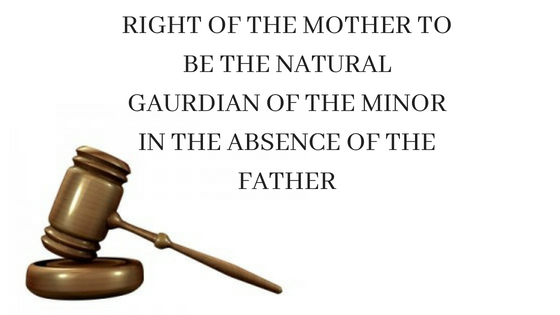Aapka Consultant Judgment Series- In this series, we are providing case analysis of Landmark Judgments of Hon’ble Supreme Court of India.
Ms. Githa Hariharan and Anr, Vs Reserve Bank of India and Anr.
AIR1999SC1149, 2SCC228
Hon’ble Judges/Coram: DR. A.S. Anand, CJI, U.C. Bannerjee and M Srinivasan, JJ.
DECIDED ON: 17TH February, 1999
FACTS:
The case, at its root, is about the right of the mother to be legally recognized as the natural guardian of the son in the husband’s absence. Ms Githa Hariharan, the first petitioner, got married to DR. Mohan Ram in 1982. In July of 1984, they have a child named Rishab Bailey out of the wedlock. In December of 1984, the petitioners applied jointly to the Reserve Bank of India (RBI) for 9% Relief Bond to be held in the name of her minor son for Rs. 20,000. The petitioner, being the mother of the child, applied to be the natural guardian of the minor in relation to the administration of the money held in her son’s name for investment purposes. The Reserve Bank of India returned the application of Ms. Githa Hariharan asking the couple either to produce the application form with the father of the child as the domestic guardian or with a certificate from a competent authority in favour of the mother’s guardianship. In response to this, Ms. Githa Hariharan filed a writ petition to have Section 6(a) of The Hindu Minority and Guardianship Act (HMG), 1956 and Section 19(b) of The Guardian and Wards Act (GW), 1890 being declared unconstitutional on the grounds of being violative of Articles 14 and 15 of the Indian Constitution. Since she submitted the same plea under her divorce proceedings, the court clubbed the two and heard them together.
ISSUE:-
- Whether the mother of a minor be recognized as her natural guardian under law?
- Whether a mother has an equal guardianship right over the minor as the father?
JUDGMENT:-
A cursory look at section 4 of the HMG Act reveals that the definitions of both ‘guardian’ and ‘natural guardian’ do not discriminate against the mother of the child in any manner whatsoever vis-à-vis the father and hence the mother is definitely the natural guardian of the child.
It was the stand taken by the RBI that the word ‘after’ in section 6 of the HMG Act could only mean after the lifetime of the father. However, the court held that since in disputes regarding the custody of the minor the welfare of the minor is of paramount importance, the word ‘after’ ceases to have any effect in such circumstances.
The court also remarked that section 6 ought to be interpreted in light of Article 15 of the Indian Constitution. Since the disputed interpretation of the word ‘after’ would lead to the section being held null and void on account of being discriminatory against women, this interpretation could not have possibly been on the minds of the legislators when they drafted the act six years after the commencement of the Constitution.
The court held that ‘after’ in Section 6(a) of the HMG Act need not necessarily mean ‘after the lifetime of the father’ but rather ‘in the absence of the father’, whether wilful or not. The court held that this would be a harmonious construction of the statute, without causing any violence to the language of Section 6(a). To a limited extent, the court even used precedents and existence of international instruments as evidence to validate its interpretation.
The father had been living in a state of total apathy towards the affairs of the child and the court also held that it had powers to curtail the custodial rights of the father in interest of the welfare of the child.
HELD:-
The RBI was in the wrong while denying the mother the status of ‘natural guardian’ of the child. The mother has an equivalent guardianship right as the father over her minor child. And section 6 of the HMG Act is not violative of Constitutional Provisions as word “After” in Section 6(a) of the HMG Act need not necessarily mean ‘after the lifetime of the father’ but rather ‘in the absence of the father’, whether wilful or not.
To Get Legal Opinion from Advocates/ Legal Experts, Please click here
To Get Legal Opinion from Retired Hon’ble Judges, Please click here












